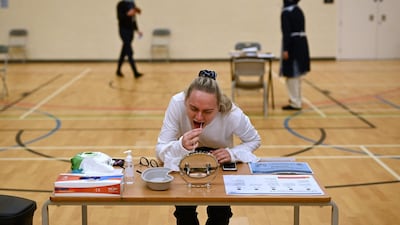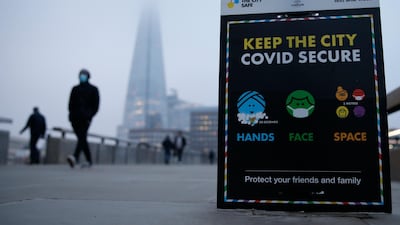Academic study must take a back seat to mental wellbeing when pupils return to school, experts said.
On Monday, children in England will follow in the footsteps of many young people globally when they finally return to the classroom after months of learning from home.
But alongside the relief felt by parents who were forced to learn how to juggle homeschooling with homelife comes the daunting challenge of smooth reintegration of children into the classroom.
The reopening of schools has typically been the first sign of Covid-19 restrictions loosening, but children face an array of challenges readjusting after such a tumultuous year.
The past 12 months sparked waves of disruption during a critical part of young people's lives, not only school closures but a steady stream of confusing information over examinations and when they get to see their friends again.
The detrimental effect on their studies – and the gaps in knowledge that might open up – are widely documented. But experts say it’s that vital pupils aren’t simply inundated with information on their return and that attention is given to the other aspects missed out on, such as social interaction.
“The danger of is that people are far too concerned with the idea of catching up with content, rather than preparing children to learn again,” said Prof Robert Dingwall, a leading UK sociologist and member of two groups advising the government on its response to Covid-19.
“We have all this talk about extending school days, having summer schools and it’s almost as if education is about cramming stuff into children. But you can't get children to learn unless they are psychologically in a fit state.
“After such an interrupted year and lack of school experience, it is going to take time for the children to settle down to learn how to focus on tasks, to rebuild their skills in interaction, to rebuild some of the basic technical things like just holding a pencil. The priority for the schools should be finding ways to get children back into that.”
It’s about making sure children feel relaxed and comfortable, he says, which could mean increased time devoted to subjects such as drama, or giving more space for creative and outdoor activities.
Of course, that doesn’t mean that school curriculums are all there is to learning. But a nuanced approach that allows an adjustment to formal learning again is important, said Dr Amelia Roberts, Deputy Director UCL centre for inclusive education.
She says it’s important to remember that learning doesn’t suddenly end at the school gates. Some pupils may even absorbed more during lockdown because they could approach their studies differently.
Dr Roberts says its important children are allowed to reconnect with their teachers, friends and the school routine.
“The advantage of that approach is that you're not taking the curriculum and the learning in isolation. We're looking at the whole experience of the transition back. And so, when you do mixed ability, whole classroom teaching, you're being inclusive, everybody's back in the classroom with their teacher, with their classmates.
“And you start to introduce the curriculum again and find out who's remembered what, who's learnt what, who’s done an exciting project, who's really struggling. So you give children – whether that’s primary or secondary – a chance to embed back into the school system, without forcing them to have long school days or catch-up that they don't need.
“It's all about including people and getting them back into the community and then making a much more nuanced assessment of what the needs are of the individual.”
On social media, the hashtag #BackToSchool shows the range of emotions many feel about Monday, with one mother joking she needed a week at a spa after “signing out of the school of mum & dad”.
A primary school teacher said her “heart burst” after she overheard some of her youngest pupils saying how excited they were to return.
PE teacher Michael Davison said physical education would play an important role in the wellbeing of children over the coming months.
Research shows the devastating toll of lockdowns on the mental health of young people, at an age when they are already going through a variety of challenges that could make them more susceptible to psychological struggles.
Claire Sewell, a learning and development specialist at the social enterprise Minds Ahead, said there’s no right or wrong way to managing the return to the classroom, but “each school should consider the individual needs of its school community and what the needs of the children and their families are”.
The Early Intervention Foundation, a charity that advocates early support for children at risk of struggling, says schools are in a unique position to help young people develop the skills to protect themselves from developing mental health issues.
Dr Freyja Fischer, researcher at the EIF, said studies show educators are the most effective people teaching these skills.
“The important thing to remember is that neither social-emotional skills development nor mental health support is the fluff around the edges of hard academic achievement. Wellbeing and mental health are measurable, and both can be supported with evidence-based interventions.
“While we all, and children especially, long for an outing to the zoo, swimming pool or museum, these excursions on their own do not support children’s social-emotional development or their mental health, neither do catch-up programmes focusing on academic achievement alone.”
Dr Roberts said it’s important to think about the children who have experienced stress at home, whether that’s because of a tumultuous environment, lack of access to the outdoors or something else. A gentle transition back into school can make all the difference to future success, she said.
Support for teachers is also important, because a stressed-out teacher at the whiteboard will be less likely to be able to respond in the right way to pupils, said Dr Roberts.
The government is looking into the possibility of a shortened summer holiday and a five-term school year to try to plug the gaps of the last year.
But Prof Dingwall says the Department of Education needs “to hit the pause button” and ask where they want children to be in September, when the new school year is scheduled to start.
“Taking the foot off the pedal for the rest of this school year seems to me to be an eminently sensible proposition and to say to the teachers ‘it doesn't really matter if you don't hit this benchmark,'” he said.
“What we want are happy kids, motivated kids, children who are enthusiastic about school and learning and the social relations that they have with each other and with their teachers. That's the really important stuff to get to by the end of the school year.”
































